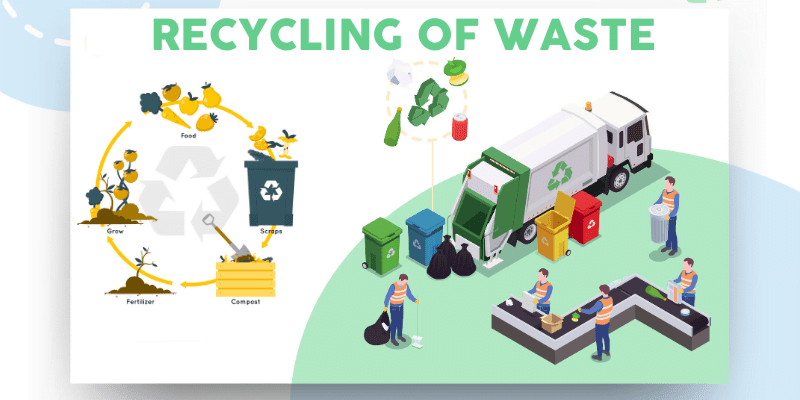Importance of Recycling: Saving Our Planet One Product at a Time:
The recycling process has become a specifically essential part of our daily lives in recent years, people are now understanding the importance of recycling as well as the adverse things that might happen if we don’t do it. Ensuring the Sustainable Preservation of Earth’s Finite Resources for Future Generations. One of the most significant ways we can do this is by recycling. In this article, we will explore the importance of recycling, the benefits it brings, and why it is crucial that we make it a priority.
Through the help of proper recycling, we can limit the amount of waste that we produce and lessen the burden on this planet. By reusing the materials that we ought to throw, we can conserve energy and natural resources. Additionally, recycling helps reduce greenhouse gas emissions, which is vital for addressing climate change.
In addition, Job opportunities also open up in the field of recycling and waste management through intensive recycling. It also contributes to a circular economy, where materials are continually reused and recycled rather than disposed of in landfills or incinerators.
Recycling Plastic:
Plastic is one of the most heavily used materials in the world. It must be noted that plastic is one of the most significant contributors to today’s waste problem. The world produces over 300 million tons of plastic waste every year and only a fraction of this is recycled. The prime reason for this is awareness. People are not aware of the problems they are going to face if they don’t start recycling.
Corporations across the globe are allocating resources to novel technologies to enhance the efficiency and affordability of recycling. Recyclable plastics are an integral constituent of the solution. These plastics are reusable and can be used to manufacture fresh products. By implementing recyclable plastics, we can minimize the amount of garbage destined for landfills and diminish the necessity for virgin materials. It is of utmost importance that we persist in fabricating sustainable resolutions for plastics to guarantee the conservation of our planet for succeeding generations.

Recyclables(Reduce, Reuse, Recycle):
Recycling extends beyond the repurposing of plastic materials and encompasses several other types of materials, including glass, paper, and metals. These diverse materials can be utilized to generate new commodities, ultimately mitigating the demand for virgin materials. This action culminates in a reduction of landfill waste and efficient use of energy necessary for raw material extraction and processing.
In the domain of sustainable waste management, the three pillars are reducing waste production, reusing materials to prolong their lifespan and minimize the need for new materials, and lastly, recycling waste materials into novel products. By embracing these principles, one can contribute to a more sustainable and environmentally responsible future.
Recyclable Products(The Future of Sustainable Living):
The development of reusable goods has taken center stage in the pursuit of a more sustainable future. Numerous corporations have now taken to manufacturing products that have been specifically engineered to be recycled, such as packaging that can be effortlessly disintegrated and repurposed. This constitutes a positive progression towards waste reduction and the preservation of our planet for the sake of posterity.
The production of reusable merchandise is not solely beneficial for the environment but also yields economic advantages. By producing goods that can be recycled, we are nurturing a circular economy where waste is transformed into a valuable resource. This serves to curtail the demand for new materials and creates an economy that is more sustainable and resistant to disruptions.
Importance of E-Waste Management (Protecting Our Environment):
Electronic waste, commonly referred to as e-waste, is a significant contributor to the issue of waste accumulation. Electronic gadgets encompass diverse dangerous components, including but not limited to, lead and mercury, which if inappropriately disposed of can cause tremendous harm to the environment. To ensure the responsible and secure disposal and recycling of these components, the efficient management of e-waste is pivotal.
Multiple nations have implemented statutes and edicts to administer the appropriate e-waste disposal. These regulations mandate the manufacturers bear the onus of disposing of their products when they are no longer serviceable. This measure has stimulated the evolution of pioneering technologies and processes, culminating in the secure recycling of e-waste components and mitigating the likelihood of hazardous materials being emancipated into the ecosystem.

Scrap Plastic (From Waste to Resource):
Many enterprises are grappling with the issue of scrap plastic. Innovative Use of Waste Plastic by Corporations: Transforming Garbage into Novel Goods. This approach not only curbs the amount of plastic dumped in landfills but also diminishes the necessity for primary resources. By employing scrap plastic, we can mitigate the environmental impact of plastic fabrication and establish a more sustainable future.
Benefits Of Recycling:
Recycling possesses a myriad of advantages for humanity and the environment. The act of reducing the quantity of waste sent to landfills, for instance, results in a notable reduction of the impact on the environment. This, in turn, contributes to a decrease in greenhouse gas emissions and the preservation of natural resources. Recycling furthermore generates employment opportunities within the recycling and waste management sectors, providing a boost to local economies while simultaneously promoting sustainable living.
Moreover, recycling yields positive effects on human health. With a decrease in waste generation and proper disposal methods for hazardous materials, people and their communities can protect themselves from the pernicious consequences of pollution.
Conclusion:
In conclusion, recycling is an essential part of our efforts to create a sustainable future. Achieving a Circular Economy: Embracing Reduce, Reuse, and Recycle for Transforming Waste into Valuable Resources. We must continue to develop sustainable solutions for plastics, e-waste, and other materials to preserve our planet for future generations. By working together, we can create a more sustainable and resilient world.
**********
Disclaimer:- Views expressed are the author’s own.
Frequently Asked Questions
- What are recycling and its importance?
Recycling is the process of transmuting detritus into reusable materials. Its momentousness resides in the variety that it aids in conserving innate resources, curtails the volume of refuse transported to landfills, and diminishes the emanation of greenhouse gasses.
- What are the benefits of recycling?
The benefits of recycling include conserving resources, reducing energy usage, decreasing landfill waste, and preventing pollution.
- What are the advantages of recycling?
The advantages of recycling include saving energy, reducing greenhouse gas emissions, and creating jobs in the recycling industry.
- What are the types of recycling?
The three main types of recycling are paper recycling, plastic recycling, and metal recycling. Other types include glass, electronics, and organic waste recycling.
- Why is recycling important to the Earth?
Recycling is important to the Earth because it helps conserve natural resources and reduces the negative impact of waste on the environment.
- Why does recycling save the Earth?
Recycling saves the Earth by reducing the amount of waste that ends up in landfills, conserving natural resources, and reducing energy usage and greenhouse gas emissions.




